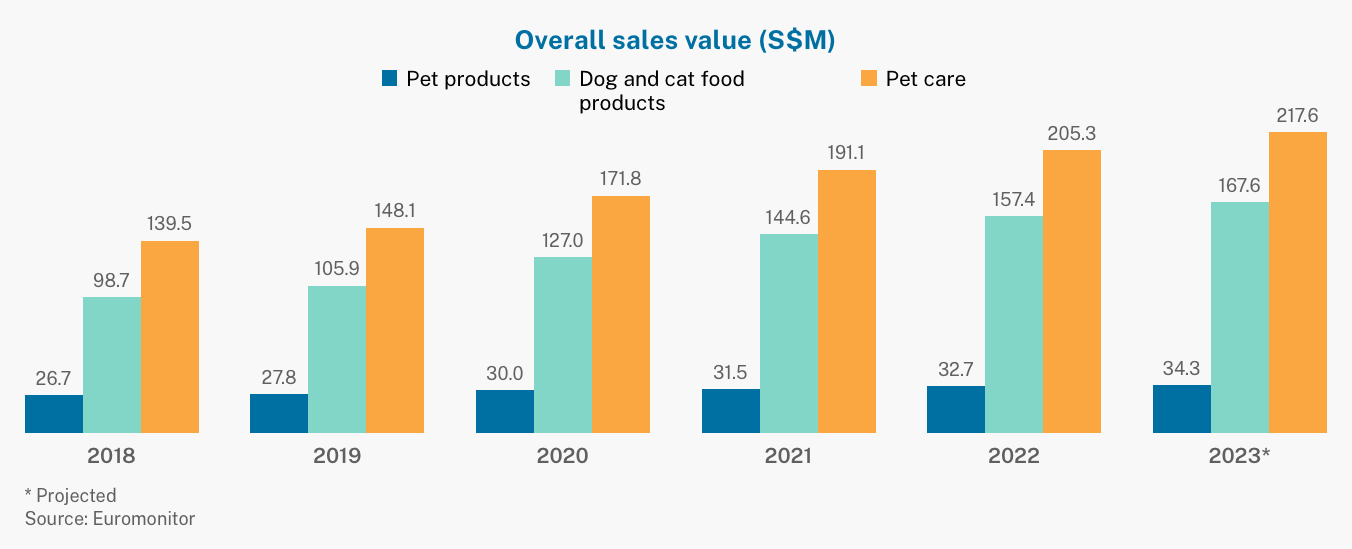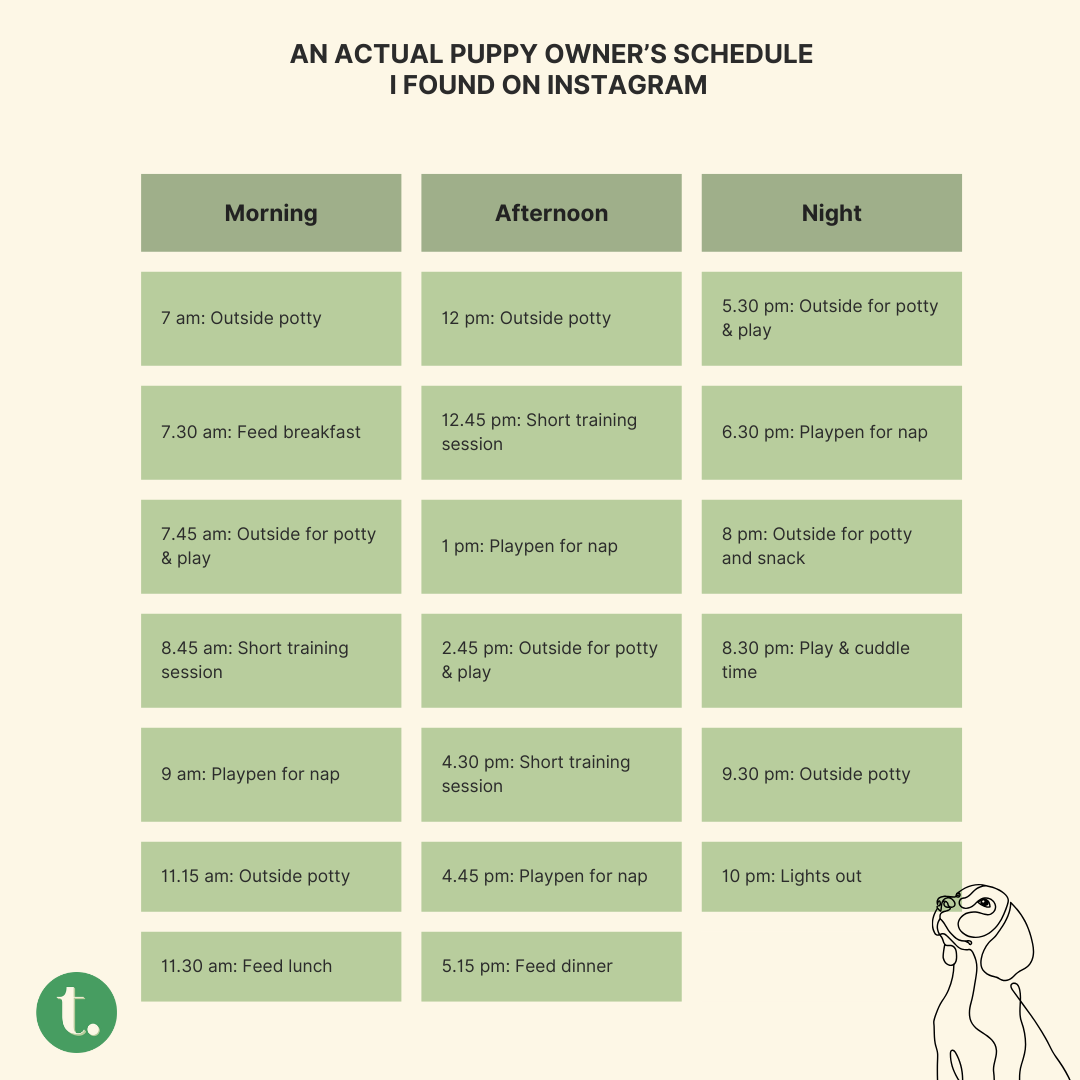🐶 How much it costs to be a pawrent

Find out more and sign up for Thrive at bt.sg/thrive
🐩 Rising pet ownership
Earlier this year, I had to bring my three-year-old cocker spaniel for surgery. Popcorn was born with bad hips and the vet recommended that her hip joint be removed so it would stop causing her pain. The bill came up to S$3,500.
The surgery was successful, but for weeks after that, she refused to walk with one of her hind legs. This continued to the point where the muscles on that leg visibly began to waste away.
For a few months, I had to send her for physiotherapy at a specialist pet rehabilitation centre. While she (thankfully) recovered, the process ultimately racked up a considerable sum.
Boutique pet businesses, such as those providing rehabilitation services, pet hotels and artisanal pet products, have been popping up in recent years.
This comes amid a rise in pet ownership in Singapore. From 2019 to 2022, the number of dogs licensed by the Animal and Veterinary Service grew by almost 25 per cent, from 70,000 to 87,000.
At the same time, with more newly-weds getting pets instead of babies, the evolving demographic of pet owners means owners are now more willing to splurge on their fur kids.

💲 What does it take to raise one?
Beyond the obvious costs, such as vet visits and food, not many non-pet-owners realise how much it can cost to keep a pet, owner Wyn Heng, 30, tells Thrive.
“People don’t know how expensive grooming services can be, depending on the breed. Like holy ****,” says Heng, who owns five labrador retrievers.
First, the price of the pet: During the pandemic, prices of dogs and cats soared as much as two or three times, as demand rose amid a limited supply of imported pets.
Prices of dogs and cats have since fallen, but can vary widely depending on breed, and, of course, the type of pet you’re getting. Today, buying a small dog from a pet shop can cost around S$4,500 and a ragdoll kitten around S$4,000.
Adopting a pet comes with fees as well, though they are much lower than if you were to buy. For example, the adoption fee for a Singapore Special puppy from the SPCA is S$250 and for a kitten, S$100. Those fees cover vaccination, sterilisation, deworming and microchipping.
Medical costs: Many owners choose to sterilise their pets for health reasons. That can cost you around S$170 to S$450 for cats and S$400 to S$900 for dogs.
Beyond that, expect to pay about S$30 to S$60 for consultation fees each time you visit the vet. But be prepared to fork out more for medication as well as tests or scans that will need to be done.
Some pet owners opt for pet insurance, which costs around S$80 to S$750 per year. Many pet insurance plans, however, require you to pay a deductible for each medical claim and/or a percentage of the bill – this is known as co-insurance. So there are still going to be some out-of-pocket costs.

Food: Depending on the brand, a month’s worth of kibbles can cost around S$80 a month for a medium-sized dog.
These days, more modern pet food companies have popped up selling fresh or freeze-dried food made with human-grade ingredients and pitched as being more nutritious. These can cost as much as S$250 per month for a medium-sized dog.
Be prepared, too, to set aside some costs for treats, toys and other miscellaneous expenses such as crates, pee pads and litter for your fur kid.
Grooming: Sending your pet to the groomer’s regularly is important and can be essential, especially for dog and cat breeds with longer fur.
There are two main types of grooming services. Basic grooming for cats and dogs, which includes showering and nail cutting, ranges from around S$40 to S$140 depending on size and breed. Full grooming, which also includes a haircut, will cost roughly between S$80 and S$170.
Training and boarding: It’s possible to train your dog by yourself, but first-time dog owners will benefit from attending obedience classes with an experienced trainer. That will likely cost around S$450 to S$1,000 for several weeks of basic obedience group classes.
And if you don’t have a family member or friend who can take care of your pet while you’re away from home for a holiday or work, boarding prices start at around S$40 per night.
⏳ The biggest cost of all
Apart from one-off costs and unforeseen medical costs, there are several other fees associated with being a pet owner. These may seem small, but they add up. For each of my three dogs at least, my family spends an estimated S$350 a month on just the recurring costs, mostly on fresh food and supplements .
But in my mind, the biggest cost of having a pet is your time. Pets have strict feeding schedules and depend on you for almost all their needs, even when they grow older.
One of my dogs will only go potty on grass patches outdoors, so my family can’t leave the house empty for more than a few hours at a time. I also make it a point to walk them for at least 30 minutes a day, and a portion of every weekend is spent bringing them out to the park.

Heng, the labrador owner, believes that while some things such as obedience classes or pet boarding aren’t always necessary, owners must be prepared to pay the intangible costs.
For Heng, it’s about being willing to have patience with your pets – to train them, to not be frustrated when they react aggressively, or to clean up after them when they’re having bowel problems the entire night.
“This type of patience is really unquantifiable,” he adds.
In my view, those who are not prepared to sacrifice their time and money to take care of a pet, especially when it gets sick, should not become pet owners.
I’m not saying that anyone who spends less money on their dogs is any lesser of a dog owner than I am. Are there ways to save on costs while providing my dog the same level of care? Of course.
But for all the love and happiness my dogs have given me, I want to be able to provide for my dogs as best I can for the limited time they have in this world.
TL;DR
More in Singapore are choosing to own pets even as the price of caring for them has risen
The growing demand has fueled a boom in premium pet services, as more are splurging on their pets
Food, toys, grooming and – most importantly – medical costs are a considerable financial commitment
But the biggest commitment is likely to be your time
KEYWORDS IN THIS ARTICLE
BT is now on Telegram!
For daily updates on weekdays and specially selected content for the weekend. Subscribe to t.me/BizTimes
Companies & Markets
Stellantis misses forecasts with 12% revenue drop in Q1, sees stronger H2
L'Occitane's billionaire owner Geiger to take firm private in US$1.8 billion deal
Australian budget airline Bonza collapses, passengers stranded
HSBC CEO to retire; bank reports 1.7% lower Q1 profit of US$10.8 billion
AIA launches wealth centre targeting high-net-worth clients
Samba, Gazelle shoes help drive Adidas sales while North America lags
